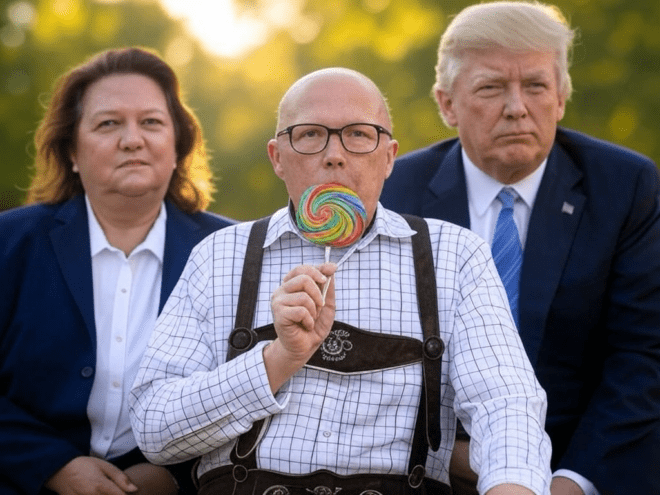
Introduction
Populism has emerged as a defining force in contemporary politics, reshaping democratic landscapes worldwide. From Donald Trump’s rise in the United States to the Brexit movement in the United Kingdom and the shifting dynamics of Australian conservatism, populist leaders have capitalised on public discontent with traditional elites. This post examines two prominent populist figures: Nigel Farage in the UK and Peter Dutton in Australia. Both have positioned themselves as champions of “the people” against perceived out-of-touch establishments, yet their actions and rhetoric invite scrutiny. As one observer aptly noted, “I’ve said it before and I’ll say it again: Trump is not the champion of the average American. While grassroots supporters may be sincere, he remains just another elite in a power struggle.” This critique of Trump serves as a useful framework to assess Farage and Dutton. Are they genuine advocates for the disenfranchised, or do their populist personas mask a bid for dominance within elite circles? Through a comparative analysis of their political careers, rhetoric, and policy impacts, we argue that while Farage and Dutton leverage populist strategies effectively, their agendas often align more with personal ambition and elite power dynamics than with the interests of the average citizen.
Defining Populism
Populism is a contested concept, but scholars like Cas Mudde and Cristóbal Rovira Kaltwasser describe it as a “thin ideology” that pits “the pure people” against “the corrupt elite.” It thrives on anti-establishment sentiment, often rejecting institutional norms and expert-driven governance in favour of direct appeals to public grievances. Populist leaders typically employ divisive “us versus them” rhetoric, framing themselves as outsiders despite often having deep ties to political systems. In the UK and Australia, Farage and Dutton exemplify this approach, though their contexts – Brexit-driven Euroscepticism and Australia’s immigration debates – differ significantly. This analysis explores how their populism manifests, its effectiveness, and its implications for democratic governance.
Nigel Farage: The Brexit Architect
Nigel Farage’s political career is synonymous with the UK’s departure from the European Union. As a founding member of the UK Independence Party (UKIP) and later the Brexit Party (now Reform UK), Farage has spent decades railing against the EU as an unelected, elitist bureaucracy eroding British sovereignty. His rhetoric – laden with references to “taking back control” and defending “ordinary Brits” – epitomises populist anti-elitism. Farage’s success in the 2016 Brexit referendum, where 52% of voters opted to leave the EU, marked a high point for his brand of right-wing populism, fuelled by fears of immigration and globalisation.
Farage’s outsider image is carefully crafted. Despite his private education at Dulwich College and early career as a commodities trader in the City of London, he portrays himself as a man of the people, often seen with a pint in hand, decrying the “Westminster bubble.” His media presence, including stints on GB News and frequent BBC appearances, amplifies this persona, giving him a platform disproportionate to his electoral success – until 2024, he had failed seven times to win a Westminster seat. His eventual victory as MP for Clacton in 2024, leading Reform UK, cemented his influence, with the party securing 14% of the national vote in that election.
Farage’s populism hinges on a clear “us versus them” dichotomy. He casts immigrants, EU bureaucrats, and liberal elites as threats to British identity, while positioning himself as the voice of the “forgotten” working class, particularly in post-industrial regions like the North of England. His 2016 referendum campaign leaned heavily on anti-immigration sentiment, with the infamous “Breaking Point” poster depicting a queue of migrants – a move critics decried as xenophobic. Yet, Farage’s policies, such as advocating tax cuts and deregulation, often align with the interests of wealthy backers like Richard Tice, who funds Reform UK, raising questions about his commitment to workers over elites.
Applying the Trump critique, Farage’s grassroots support appears sincere – voters in Clacton and Brexit-backing “Red Wall” constituencies genuinely see him as their advocate. However, his ties to Donald Trump, whom he has called “the bravest person I’ve ever met,” and his appearances at Mar-a-Lago suggest a comfort with global elite networks. Farage’s push for Brexit delivered a symbolic win for his base, but its economic fallout – disrupted trade and rising costs – has arguably harmed the very workers he claims to represent. His populism, then, may be less about uplifting the average Brit and more about securing a legacy as a disruptor among the powerful.
Peter Dutton: Australia’s Strongman
In Australia, Peter Dutton, Leader of the Opposition and head of the Liberal Party since 2022, embodies a distinct strain of populism rooted in security and national identity. A former police officer and long-serving MP, Dutton rose to prominence as Minister for Home Affairs (2017–2021), where he oversaw stringent immigration policies, including offshore detention of asylum seekers. His rhetoric often frames Australia as under threat from external forces – migrants, refugees, and progressive “woke” agendas – positioning him as a protector of “hardworking Australians.”
Dutton’s populist turn intensified after the Liberal Party’s 2022 election loss, which saw moderate urban seats fall to “teal” independents advocating climate action. Facing internal pressure to shift right, he has embraced a harder line, rejecting “Canberra elite” priorities like renewable energy in favor of nuclear power and tougher border controls. His 2025 pledge to ban refugees from Gaza, echoing Trump’s “Muslim ban,” sparked accusations of racism, but resonated with outer-suburban voters reeling from cost-of-living pressures. Polls, such as YouGov’s February 2025 MRP model, suggest Dutton’s Coalition could win 73 seats in a federal election, reflecting his growing appeal.
Like Farage, Dutton cultivates an anti-elitist image despite his insider status. A 35-year political veteran with a property portfolio worth millions, he nonetheless rails against “inner-city elites” and “woke” bureaucrats. His rhetoric – calling Labor’s Anthony Albanese out of touch and vowing to break up supermarket monopolies – mirrors populist promises of economic justice. Yet, his anti-union stance and support for business tax breaks belie this narrative, aligning him with corporate interests over workers.
Dutton’s “us versus them” framing is stark. He has linked crime to specific ethnic groups, as in his 2018 comments about “African gangs” in Victoria, and cast asylum seekers as security risks, tapping into public fears. This approach, while divisive, has proven electorally potent, much like Farage’s immigration focus. However, his wealth and ties to elite figures undermine his “friend of the worker” claim. The Trump critique applies here: Dutton’s base may see him as their champion, but his actions suggest a power play within Australia’s conservative elite, not a radical break from it.
Peter Dutton and Gina Rinehart: A Symbiotic Alliance
A key dimension of Dutton’s populism is his close relationship with Gina Rinehart, Australia’s richest person and a mining magnate whose wealth exceeds $37 billion as of 2025. This alliance, forged since Dutton’s ascension to opposition leader in 2022, reveals the tension between his “man of the people” image and his elite connections. Rinehart, a vocal advocate for deregulation, tax cuts, and fossil fuel expansion, has cultivated a bond with Dutton through financial support, personal engagements, and policy influence, raising questions about whose interests he truly serves.
Rinehart’s backing is tangible. Australian Electoral Commission disclosures show Hancock Prospecting, her company, donated $500,000 to the Coalition in 2023–24, triple its previous year’s contribution. She has hosted high-profile fundraisers for Dutton, including two in 2024 at her Queensland homes, with tickets priced at $14,000 – just below the public disclosure threshold. Dutton’s personal commitment is striking: he flew from Canberra to Perth for Rinehart’s 70th birthday in February 2024, staying just 40 minutes before returning to campaign in Melbourne’s Dunkley by-election. He later called her “a dear friend” and “Australia’s most successful businesswoman,” unapologetic despite criticism.
This relationship extends beyond optics. Dutton’s policy agenda often mirrors Rinehart’s priorities. His 2022 proposal to raise pensioners’ income thresholds – a Rinehart pet project – emerged after their meetings, as did his embrace of nuclear power, which she championed before the Coalition adopted it. His March 2025 gas reservation plan briefly strained ties when Rinehart criticised its potential impact on her gas investments, but she quickly reaffirmed her “respect” for Dutton. Posts on X in early 2025 speculated that Rinehart’s $1.1 billion gas plant deal influenced Dutton’s energy stance, dubbing her his “Musk” – a reference to Elon Musk’s sway over Trump.
Critics accuse Rinehart of “oligarchic” influence, pointing to Dutton’s anti-union policies and refusal to rule out penalty rate cuts as evidence of her sway. His office’s 2022 request for her private jet to attend a Bali bombing memorial – declared at “zero cost to taxpayers” – further blurs the line between public duty and private favor. While Rinehart’s support bolsters Dutton’s electoral war chest, it undermines his populist credibility, aligning him with a billionaire whose interests often clash with those of ordinary workers.
Peter Dutton and Justin Hemmes: The Fundraising Nexus
Another significant elite connection is Dutton’s relationship with Justin Hemmes, a billionaire hospitality tycoon whose Merivale empire dominates Australia’s dining and nightlife scene. Born in 1972 into a wealthy Sydney family, Hemmes transformed Merivale from a single fashion outlet into a $1.5 billion hospitality juggernaut, owning over 100 venues – including Ivy, Mr. Beef, and Felix – by 2025. His personal fortune, estimated at $1.2 billion, stems from a mix of inherited wealth and shrewd expansion, cementing his status as a Rich Lister and a fixture of Sydney’s elite social circuit. Hemmes’ $100 million Vaucluse mansion, The Hermitage, overlooking Sydney Harbour, symbolises his opulence and influence.
Dutton’s ties to Hemmes gained prominence in March 2025, when he attended a fundraiser at The Hermitage as Tropical Cyclone Alfred approached Queensland. The event, first reported by the Australian Financial Review, drew fierce criticism from Labor, with Senator Murray Watt accusing Dutton of “filling Liberal Party money bags while his community was filling sandbags.” Dutton defended the trip, calling it a “fundraising dinner, not a party,” and noting that both he and Prime Minister Albanese attend such events nationwide. He had begun that day in Brisbane, briefing on the cyclone, before flying to Sydney for meetings – including a lunch with a Greek Orthodox bishop – and the Hemmes event, returning on the first flight Wednesday.
The fundraiser’s details remain opaque – guest lists and amounts raised are undisclosed – but its significance is clear. Hemmes, who donated $300,000 to the Liberals in 2022, stands to gain from Coalition policies like tax-free staff lunches, a Dutton pledge aimed at small businesses, but lucrative for Merivale’s vast network. The event, priced at $25,000 per head by some reports, underscores Hemmes’ role as a financial conduit for Dutton’s campaign, mirroring Rinehart’s support but in a different sphere. Dutton’s choice to attend amid a looming natural disaster in his Dickson electorate sparked outrage, with X posts labelling him “gutless” for prioritising elite donors over constituents.
Hemmes’ backing complicates Dutton’s populist narrative. While he rails against “inner-city elites,” his hobnobbing at a harbourside mansion with a billionaire whose venues cater to affluent urbanites suggests a disconnect. The optics clash with his outer-suburban base, who face cost-of-living pressures far removed from Merivale’s upscale offerings. Like Rinehart, Hemmes bolsters Dutton’s war chest, but his involvement – tied to personal enrichment via policy – casts doubt on Dutton’s “worker’s champion” claim, aligning him with the Trump critique’s elite power struggle.
Comparative Analysis: Similarities and Differences
Farage and Dutton share core populist traits. Both exploit anti-elitism, targeting supranational bodies (the EU for Farage, the UN and “globalists” for Dutton) and progressive cultural shifts. Their rhetoric simplifies complex issues – Brexit as a sovereignty fix, immigration as a security threat – offering visceral solutions that resonate with disaffected voters. Both thrive on media amplification: Farage’s broadcast career and Dutton’s podcast appearances extend their reach beyond traditional channels.
From there, their contexts diverge. Farage operates outside the UK’s major parties, leading insurgent movements that pressure the Conservatives from the right. His success lies in agenda-setting – Brexit’s realisation – rather than governance. Dutton leads an established party, adapting its platform to populist demands while navigating internal tensions. Farage’s victories are symbolic; Dutton’s aim is executive power, with a federal election looming by May 3, 2025.
Policy impacts further distinguish them. Farage’s Brexit has delivered mixed results: sovereignty regained, but economic stagnation persists. Dutton’s policies, like offshore detention, have “worked” in deterring boat arrivals but at a human cost. Both deliver short-term wins – control for Farage’s voters, security for Dutton’s – but long-term benefits for workers remain elusive, overshadowed by elite-friendly outcomes.
The Trump Critique: Champions or Elites?
The statement – “Trump is not the champion of the average American… It’s not about workers; it’s about dominance among the powerful” – casts a critical light on Farage and Dutton. Farage’s supporters genuinely believe he fights for them, yet his post-Brexit focus on personal brand-building and Reform UK’s donor-driven structure suggest a quest for influence among global elites. His policies rarely address structural issues like NHS funding, prioritising nationalism over material gains.
Dutton’s base sees him as a bulwark against chaos, yet his wealth, anti-union record, and ties to Rinehart and Hemmes reveal a man entrenched in Australia’s power elite. His nuclear power push benefits energy firms more than households, while his divisive rhetoric risks social cohesion without addressing economic woes. Both harness real discontent but serve personal ambition and powerful allies as much as their voters, making their populism a tool for dominance.
Implications for Democracy
Farage and Dutton’s populism challenges democratic norms. Farage’s Brexit campaign, with its questionable claims, and Dutton’s attacks on the Australian Electoral Commission erode trust in institutions. Their “us versus them” narratives polarise societies, yet they expose real failures – unresponsive elites, economic inequality – that mainstream parties must address.
The risk lies in their governance potential. Farage’s Reform UK remains a pressure group, but Dutton could soon lead Australia. His strongman style, if unchecked, might mirror Trump’s authoritarian leanings. Both leaders’ reliance on fear and division threatens long-term stability.
Conclusion
Nigel Farage and Peter Dutton exemplify populism’s dual nature: a cry against elite neglect and a vehicle for personal power. Farage’s Brexit triumph and Dutton’s electoral resurgence show populism’s potency, yet their ties to elite networks and light focus on worker outcomes echo the Trump critique. They are not champions of the average citizen but players in a struggle for dominance among the powerful. Their legacies will depend on whether their nations demand substance over symbolism – or expose them as elites in populist clothing.
In a world where populism continues to rise, it is crucial for voters to discern the difference between genuine representation and mere opportunism masquerading as advocacy.


